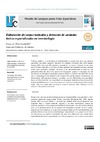Identificador persistente para citar o vincular este elemento:
https://accedacris.ulpgc.es/jspui/handle/10553/70396
| Campo DC | Valor | idioma |
|---|---|---|
| dc.contributor.author | Olmo Cazevieille, Françoise | en_US |
| dc.date.accessioned | 2020-02-20T07:49:51Z | - |
| dc.date.available | 2020-02-20T07:49:51Z | - |
| dc.date.issued | 2018 | en_US |
| dc.identifier.issn | 1133-1127 | en_US |
| dc.identifier.uri | https://accedacris.ulpgc.es/handle/10553/70396 | - |
| dc.description.abstract | Formar a los alumnos en terminología parece ser imprescindible para que lleven a bien cualquier traducción especializada. Existen manuales (Monterde, 1998; Aguilar, 2001, etc.) que ofrecen a los docentes, material sobre el que apoyarse para impartirla. Pero, a nuestro entender, algunos carecen de ejercicios prácticos y otros proponen actividades interesantes pero descontextualizadas pues no se plantean dentro de un proyecto terminográfico concreto. En este trabajo, exponemos cómo elaborar un corpus textual especializado en formato electrónico que permita estudiar el uso real de la terminología respondiendo a un proyecto concreto y nos detenemos en explicitar actividades de clase para diferenciar una unidad léxica especializada de otra no especializada con el fin de preparar a los alumnos a seleccionar los candidatos a términos. En definitiva, proponemos una metodología integradora del conocimiento, de las competencias digitales y del aprendizaje colaborativo que mejore las aptitudes de los estudiantes para desenvolverse en el mundo profesional. | en_US |
| dc.description.abstract | Training students in terminology is indispensable to ensure that they can perform specialized translation properly. Manuals are available (Monterde Rey, 2002; Aguilar Cuevas, 2001, etc.) that offer teaching materials for instructors. However, in our view, some of these materials, which have not been updated, lack practical exercises, whereas others have interesting activities, but tend to be decontextualized as they are not presented within the realm of a specific terminographic project. In this paper, we will discuss how to develop a specialized corpus in electronic format that allows the actual use of terminology to be studied in the context of a specific project. Furthermore, we demonstrate, with practical classroom activities, how to differentiate one specialized lexical unit from another non-specialized one, to prepare students on how to select the correct candidate terms. In short, we propose an integrative methodology of knowledge, digital skills and collaborative learning to improve students’ skills, enabling them to succeed in the professional world. | en_US |
| dc.language | spa | en_US |
| dc.relation.ispartof | LFE. Revista de Lenguas para Fines Específicos | en_US |
| dc.source | LFE. Revista de lenguas para fines específicos [eISSN 2340-8561], v. 24 (2), p. 54-70 | en_US |
| dc.subject | 570107 Lengua y literatura | en_US |
| dc.subject | 550510 Filología | en_US |
| dc.subject.other | Terminología | en_US |
| dc.subject.other | Corpus textuales | en_US |
| dc.subject.other | Unidades léxicas especializadas | en_US |
| dc.subject.other | Metodología activa | en_US |
| dc.subject.other | TIC | en_US |
| dc.subject.other | Proyecto en cooperación | en_US |
| dc.subject.other | Text corpora | en_US |
| dc.subject.other | Specialized lexical units | en_US |
| dc.subject.other | Active methodology | en_US |
| dc.subject.other | ICT | en_US |
| dc.subject.other | Project cooperation | en_US |
| dc.title | Elaboración de corpus textuales y detección de unidades léxicas especializadas en terminología | en_US |
| dc.type | info:eu-repo/semantics/article | en_US |
| dc.type | Article | en_US |
| dc.identifier.doi | 10.20420/rlfe.2018.234 | en_US |
| dc.investigacion | Artes y Humanidades | en_US |
| dc.type2 | Artículo | en_US |
| dc.identifier.ulpgc | Sí | es |
| dc.description.esci | ESCI | |
| dc.description.dialnetimpact | 0,0 | |
| dc.description.dialnetq | Q1 | |
| dc.description.dialnetd | D2 | |
| dc.description.erihplus | ERIH PLUS | |
| item.grantfulltext | open | - |
| item.fulltext | Con texto completo | - |
| Colección: | Artículos | |
Visitas
27
actualizado el 10-ene-2026
Descargas
49
actualizado el 10-ene-2026
Google ScholarTM
Verifica
Altmetric
Comparte
Exporta metadatos
Los elementos en ULPGC accedaCRIS están protegidos por derechos de autor con todos los derechos reservados, a menos que se indique lo contrario.
